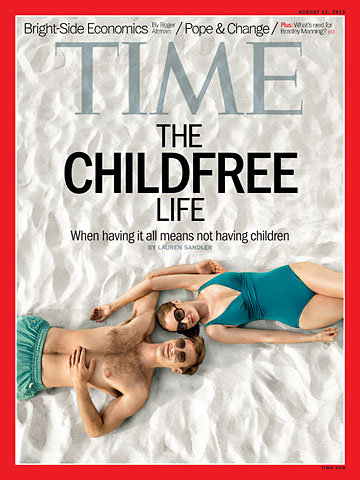
(4 of 4)
Patricia O'Laughlin, a therapist in Los Angeles who specializes in counseling women who are ambivalent about their choice, says the identity that childless women developed as little girls around the expectation of motherhood is the most painful stumbling block. Even the decisive ones aren't immune: Leah and Paul Clouse keep a baby box in the closet with a pink tutu she once bought for an imaginary infant girl and an article on raising nerdy children that he says spoke to him. "It's indulgent of a life I have to grieve," Leah says. "If we decided to have children, we'd have to grieve the life we currently have."
Even if you are in the minority of women who don't grow up internalizing the idea that you are predestined for parenthood, the mommy drone doesn't quiet. "I resent that the entire culture of this country is obsessed with kids," Rachel Agee told me the day after her 40th birthday. "And social media is only an outlet to post pictures of your children. I've got nothing to put on Facebook. At 40, that's hard." (She has not yet bought the buzzed-about Facebook baby-blocker app to censor progeny pics, but she says she's tempted.) Agee graduated from a Southern Bible college where she was taught that to be a godly woman, one must procreate for the kingdom. "I just knew I couldn't trade my freedom for it," she says. She moved to Nashville as a hopeful performer and stopped going to church because it was so "oppressively family-centric." Nearly 30% of married households in the Nashville metropolitan area are childless, but even in the secular, artier corners of Music City, Agee wasn't greeted by a culture that supported a life without dependents. It used to be that one's urban starter kit would include a leather jacket, a guitar and a pack of cigarettes. Today that's been traded out for Lululemon maternity pants, a stroller and a pack of diapers.
"I've always felt there was a cultural imperative — now there's a subcultural imperative," says Kate O'Neill. She and her partner moved from California to Nashville; she went there to write songs — though she's now one of the city's top entrepreneurs — and he went there to paint. Despite the high rate of childlessness, O'Neill says, it was hard to find her way into a social world where "lately, motherhood has been so absorbed into every possible aesthetic." I heard similar observations from women I interviewed in Boston, Austin and San Francisco.
Eleanore Wells, a market researcher in New York City, says that even in her mid-50s, she finds judgment at every turn. "So many women take my choice personally," she says. Recently, she told me, a woman on the subway inquired if she had children and then asked, aghast, "Who is going to take care of you when you're old?" Wells wanted to reply that nursing homes are filled with parents, but she says she just smiled, went home and packed her bags for an annual trip to Martha's Vineyard with friends. "When I was younger I found it more exhausting," she says. "Now I don't give a s — - what anyone thinks. It gets easier."
Navigating the Choice
Laura Scott runs the childless by choice documentary project, which gathers stories of people who opt out of parenthood. "To make this choice, you really have to be able to manage and navigate all assumptions that are going to be made about you," she says. "You have to be able to challenge the status quo."
"It's toughest in your late 30s and early 40s," Going Solo author Eric Klinenberg says. That's when social isolation tends to peak among people without kids. "What people report everywhere is this experience of watching friends just peel off into their small domestic worlds. That's the real stress point," he says, not aging and dying alone, as people fear — and strangers and family members alike tend to admonish — but the loneliness between when friends have babies and when they become empty nesters. It has hit the Clouses earlier than Klinenberg suggests, since their Southern Christian circle seems to have already disappeared into parenthood. They say their lives have become lonelier and narrower over the past few years. "You build strong relationships, and then they change. It's great for them, but it sucks for you," Clouse says. But they recently had their first "date" — roller derby — with a childless couple at their church. They say it felt like a massive relief.
As the childless numbers creep up, so do opportunities to make a full, connected life with other nonparents. The community networking site Meetup.com alone has about 20,000 members of child-free groups in about 90 metropolitan areas — one for women in suburban New Jersey, one for singles and couples in Chicago and so on. In a suburban Nashville mall one Friday evening, a child-free group gathers around a long table at Buffalo Wild Wings. Most of the 24 people here live in developments nearby, and none of them have kids. Recent activities have included zip-lining, canoeing and the monthly dinner the foodie couple in the group organizes. "We can do anything we want, so why wouldn't we?" Andrea Reynolds says, cueing a round of clinking beer glasses. The one thing they don't do much of, her husband says, is talk about "the no-kids thing" when they're together. "It's kind of the only place where we don't have to answer those questions," he says.
Deeper into the city the next night, at her 40th-birthday celebration, Rachel Agee announced, "My wish for myself at 40 is to be who I've chosen to be and not to feel like I have to defend it." Her friends, nearly all childless, applauded.
